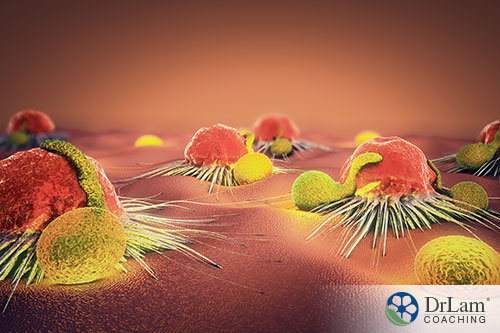 Your body has an extraordinary self-healing ability. Your immune system plays a key role, but there are steps you can take to support it. Your health, to a large extent, is determined by what you eat, how much you move, and your environment. But mental health is also important. Therefore, it is essential that you take the time to look after your psychological welfare as well. Whether you meditate, practice deep breathing exercises, or just take the time to be out in nature, it all helps.
Your body has an extraordinary self-healing ability. Your immune system plays a key role, but there are steps you can take to support it. Your health, to a large extent, is determined by what you eat, how much you move, and your environment. But mental health is also important. Therefore, it is essential that you take the time to look after your psychological welfare as well. Whether you meditate, practice deep breathing exercises, or just take the time to be out in nature, it all helps.
At the end of the day, the more you know about your body, how it works, and what you can do to support self-healing and optimal health, the better off you and your body will be in the long-term. By making appropriate choices for all aspects of your health and giving your body what it needs to function at its best, you will be setting yourself up to live a longer and healthier life.
There are, essentially, four things each of us can do to ensure our bodies get what they need in order to stay healthy and function correctly. These are:
When you follow the above criteria, you are setting the stage for your body to start the self-healing process as and when needed. Essentially, your body’s inability to heal itself is determined by how much wear and tear it is exposed to.
Health and certain health conditions are not really opposites of each other. To a large extent, developing certain health issues is your body’s attempt at restoring health. For example, inflammation and fever is a natural result of something being wrong with you and is your body’s self-healing response. It also ties in with your body’s immune system. Understanding how this system works can help you make the right choices to help your body heal.
Your immune system is an exceedingly complex system geared 100% towards fighting off pathogens while striving for self-healing.
Constantly exposed to various stressors like toxins, pollutants, viruses, fungi, parasites, and bacteria, your immune system is always working at addressing these and other issues that could compromise your health. The various components of your immune system include cells, organs, tissues, and proteins that actively work together in order to sustain health.
People with adrenal fatigue, a NeuroEndoMetabolic (NEM) Stress Response dysregulation, or an autoimmune condition may need to take extra care in keeping their immune response working at the most optimal level possible. They may be more susceptible to various health issues.
Your immune system has two components: your innate immune system and your adaptive immune system.
Innate or natural immunity is inherited. This type of immunity protects you from external threats via phagocytic cells that attack pathogens. It does this by engulfing them and then eliminating them. Some of the first responders when your innate immune system kicks in are your neutrophils. A neutrophil is a type of white blood cell.
 Your innate immunity also releases cytokines when in action. These cytokines stimulate immune cells so that they will move to an injured site. Natural killer cells are also released. The latter kill off infected cells or cancer cells.
Your innate immunity also releases cytokines when in action. These cytokines stimulate immune cells so that they will move to an injured site. Natural killer cells are also released. The latter kill off infected cells or cancer cells.
Your innate immune system offers a broader immunity, and its various cell components have a relatively short lifespan.
Your adaptive immune system has a more specific, specialized function. It targets a specific issue, solves the problem of how to fight off an issue, then creates antibodies that do the job. These antibodies are created by B cells and cytokines that are created by T helper cells and their own NK cells. NK cells are lymphocytes that develop in your bone marrow.
Once the issue is resolved, your body’s newly developed antibodies “remember” the illness and ensure future immunity against it.
Inflammation tends to set in the moment your immune system is activated. It is a natural response and indicates your immune system is working to protect you. Many people are unaware that Adrenal Fatigue Syndrome (AFS) could cause inflammation.
With inflammation, blood capillaries dilate and their walls become porous. This allows for white blood cells to move through the blood vessel walls and address the damage. Swelling and pain are often common due to the buildup of fluids on the nerves in these areas, while the heat felt is due to an increase in blood flow at the site. Essentially, inflammation is part of your self-healing process.
While inflammation is usually short-lived, unchecked inflammation could cause long-term issues that may result in health issues connected to chronic inflammation. Your body’s self-healing abilities may be compromised under these circumstances.
Your immune response and inflammation are determined by stress. Although we think of stress in terms of a mental challenge, stress can also be physical in nature or the result of environmental factors. In either case, your body responds with an increase in cortisol production. This increased cortisol production is usually of short duration, but when the stress stays or even increases, the cortisol production and the corresponding immune and inflammatory responses continue. In the long run, your immune system function is compromised while low-grade chronic inflammation may set in. This is often found in people with AFS as well as with a number of inflammatory disorders.
Health issues associated with chronic inflammation include, amongst many others:
Supporting your immune system is something best done on different levels, taking into account your diet, lifestyle, and relationships, whether at home or work. Furthermore, there are many supplements that could help the physical support of your immune system. However, you need to take various factors into consideration when opting for supplements, especially if you have AFS or other chronic conditions. It is always best to consult with a qualified healthcare practitioner who may suggest the correct supplements needed and their dosage.
 Balance is key. Maintaining a balanced diet by incorporating all the nutritional elements needed by your body is important for self-healing to take place. Furthermore, trying to keep exposure to any harmful environmental elements to a minimum and making sure that you get enough of the right type of exercise are also important. Remember that AFS sufferers need to take their stage of adrenal fatigue into consideration when embarking on any form of physical activity. Depending on your stage of the condition, exercise may do more harm than good in the long-term.
Balance is key. Maintaining a balanced diet by incorporating all the nutritional elements needed by your body is important for self-healing to take place. Furthermore, trying to keep exposure to any harmful environmental elements to a minimum and making sure that you get enough of the right type of exercise are also important. Remember that AFS sufferers need to take their stage of adrenal fatigue into consideration when embarking on any form of physical activity. Depending on your stage of the condition, exercise may do more harm than good in the long-term.
Taking care of your mental health is just as important as taking care of your body. In the stressful environment, we live in today, we are increasingly submitted to mental stress which could impact your immune system and its corresponding inflammatory response. Take care of yourself, and give yourself some time to pursue those activities that have a calming effect on you.
A compromised immune system and inflammatory response may worsen adrenal fatigue. The inverse is also true. If suffering from adrenal fatigue, your self-healing ability may be compromised. You may need to look into both adrenal and immune system support.
